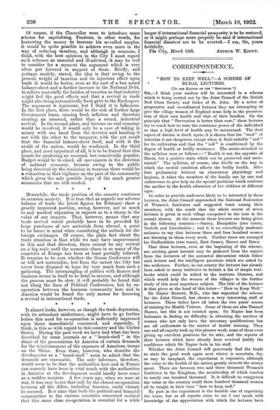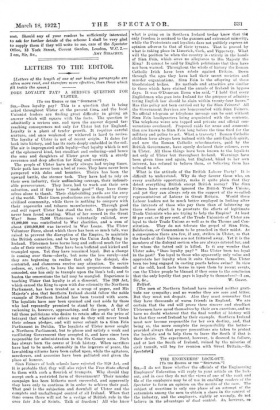CORRESPONDENCE.
"HOW TO KEEP WELL" —A SCHEME OF RURAL LECT UNES.
[To THE Eorros or rus " Spacreros."1 Sta,—I think your readers -will be interested in a scheme which is being carried out by the Joint Council of the British Red Cross Society and Order of St. John. By a series of progressive and co-ordinated lectures they are attempting to give the village women of England some help in the preserva- tion of their own health and that of their families. On the principle that " rievention is better than eure," these lectures try to teach how to raise the resistance power of the individual so that a high level of health may be maintained. The dual aspect of disease is dwelt upon; it is shown that the "seed" of infection is not dangerous except when it finds suitable "sell" for its cultivation and that the " soil " is conditioned by the degree of health or bodily resistance. The motto attached to the syllabus runs as follows :—" Health 113 not the opposite of illness, but a positive state which can be preserved and main- tained." The syllabus, of course, also dwells on the way in which the mental condition affects the bodily health. After four preliminary lectures on elementary physiology and hygiene, it takes the members of the family one by one and endeavours to give help on the special problems which confront the mother in the health education of her children at different ages.
In order to provide audiences likely to be interested in these lectures, the Joint Council approached the National Federation of Women's Institutes and suggested toms among their members, with the result that the whole -course of seven lectures is given in each village comprised in the tour in the county chosen. At the moment these lectures are being given in the following counties :—Surrey, Hampshire (two tours), Norfolk and Lincolnshire ; and it is an exceedingly moderate estimate to say that between three and four hundred women are listening to them every week. Further tours are arranged for Staffordshire (two tours), East Sussex, Dorset and Essex.
That these lectures, even at the beginning of the scheme, are exciting great interest may be gathered from the reports from the lecturers of the animated discussions which follow each lecture and the intelligent questions which are asked by the audiences. Further, in one county the lecturer has already been asked in many institutes to furnish a list of Simple text- books which could be added to the institute libraries, and which would help the women of the villages in the further study of this most important subject. The title of the lectures is that given at the head of this letter—" How to Keep Well."
Sir Napier Burnett, M.D., who has organized the scheme for the Joint Council, has chosen a very interesting staff of lecturers. These ladies have all taken the two years' course of training for Health Visitors. Some of them are also Trained Nurses, but this is not insisted upon. Sir Napier has been fortunate in finding no difficulty in obtaining the services of women who not only have the necessary qualifications but are all enthusiasts in the matter of health training. They one and all eagerly took up this pioneer work, some of them even giving up excellent positions for its sake, and the reports of their lectures which have already been received justify the confidence which Six Napier feels in his staff.
Whether the Joint Council will generously find the funds to start the good work again next winter is uncertain, for, as may be imagined, the experiment is expensive, although the value to the health of the nation greatly exceeds the money spent. There are between two and three thousand Women's Institutes in the Kingdom, the membership of which reaches to nearly one hundred thousand. It is difficult to exaggerate the value to the country could these hundred thousand women all be taught in their turn "how to keep well."
My part in the experiment is the humble one of organizing the tciurs, but as all reports come to me I can speak with knowledge of the appreciation with which the lectures have
met. Should any of your readers he sufficiently interested to ask for further details of the scheme I shall be very glad to supply them if they will write to me, care of the Spectator Office, 13 York Street, Covent Garden, London, W.C. 2.-



































 Previous page
Previous page